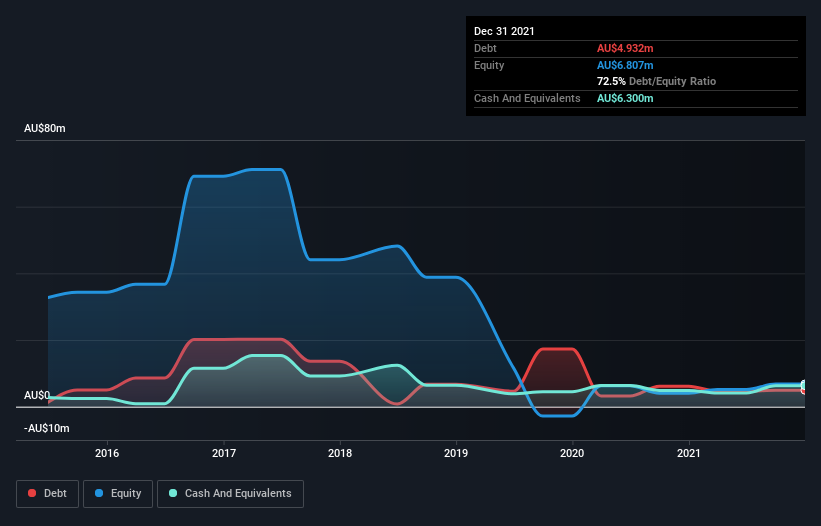Is IncentiaPay (ASX:INP) Weighed On By Its Debt Load?
Legendary fund manager Li Lu (who Charlie Munger backed) once said, 'The biggest investment risk is not the volatility of prices, but whether you will suffer a permanent loss of capital.' So it might be obvious that you need to consider debt, when you think about how risky any given stock is, because too much debt can sink a company. Importantly, IncentiaPay Limited (ASX:INP) does carry debt. But the more important question is: how much risk is that debt creating?
Why Does Debt Bring Risk?
Generally speaking, debt only becomes a real problem when a company can't easily pay it off, either by raising capital or with its own cash flow. In the worst case scenario, a company can go bankrupt if it cannot pay its creditors. However, a more frequent (but still costly) occurrence is where a company must issue shares at bargain-basement prices, permanently diluting shareholders, just to shore up its balance sheet. Of course, the upside of debt is that it often represents cheap capital, especially when it replaces dilution in a company with the ability to reinvest at high rates of return. The first step when considering a company's debt levels is to consider its cash and debt together.
View our latest analysis for IncentiaPay
What Is IncentiaPay's Net Debt?
The image below, which you can click on for greater detail, shows that IncentiaPay had debt of AU$4.93m at the end of December 2021, a reduction from AU$6.16m over a year. But it also has AU$6.30m in cash to offset that, meaning it has AU$1.37m net cash.

A Look At IncentiaPay's Liabilities
According to the last reported balance sheet, IncentiaPay had liabilities of AU$16.6m due within 12 months, and liabilities of AU$890.0k due beyond 12 months. Offsetting this, it had AU$6.30m in cash and AU$658.0k in receivables that were due within 12 months. So it has liabilities totalling AU$10.5m more than its cash and near-term receivables, combined.
This deficit isn't so bad because IncentiaPay is worth AU$22.8m, and thus could probably raise enough capital to shore up its balance sheet, if the need arose. However, it is still worthwhile taking a close look at its ability to pay off debt. While it does have liabilities worth noting, IncentiaPay also has more cash than debt, so we're pretty confident it can manage its debt safely. There's no doubt that we learn most about debt from the balance sheet. But you can't view debt in total isolation; since IncentiaPay will need earnings to service that debt. So when considering debt, it's definitely worth looking at the earnings trend. Click here for an interactive snapshot.
In the last year IncentiaPay had a loss before interest and tax, and actually shrunk its revenue by 34%, to AU$20m. That makes us nervous, to say the least.
So How Risky Is IncentiaPay?
Statistically speaking companies that lose money are riskier than those that make money. And in the last year IncentiaPay had an earnings before interest and tax (EBIT) loss, truth be told. And over the same period it saw negative free cash outflow of AU$11m and booked a AU$12m accounting loss. With only AU$1.37m on the balance sheet, it would appear that its going to need to raise capital again soon. Overall, we'd say the stock is a bit risky, and we're usually very cautious until we see positive free cash flow. The balance sheet is clearly the area to focus on when you are analysing debt. However, not all investment risk resides within the balance sheet - far from it. We've identified 4 warning signs with IncentiaPay (at least 1 which is concerning) , and understanding them should be part of your investment process.
If, after all that, you're more interested in a fast growing company with a rock-solid balance sheet, then check out our list of net cash growth stocks without delay.
Valuation is complex, but we're here to simplify it.
Discover if Entertainment Rewards might be undervalued or overvalued with our detailed analysis, featuring fair value estimates, potential risks, dividends, insider trades, and its financial condition.
Access Free AnalysisHave feedback on this article? Concerned about the content? Get in touch with us directly. Alternatively, email editorial-team (at) simplywallst.com.
This article by Simply Wall St is general in nature. We provide commentary based on historical data and analyst forecasts only using an unbiased methodology and our articles are not intended to be financial advice. It does not constitute a recommendation to buy or sell any stock, and does not take account of your objectives, or your financial situation. We aim to bring you long-term focused analysis driven by fundamental data. Note that our analysis may not factor in the latest price-sensitive company announcements or qualitative material. Simply Wall St has no position in any stocks mentioned.
About ASX:EAT
Entertainment Rewards
Engages in the operation of an entertainment, lifestyles, and rewards platform in Australia and New Zealand.
Slight risk and slightly overvalued.
Market Insights
Community Narratives



